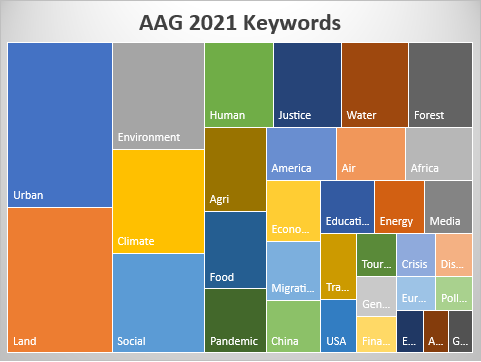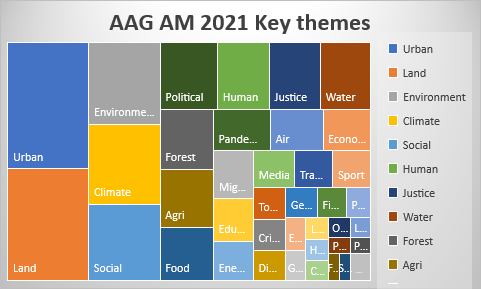What is the science of geography about in 2021?
Corvinus Associate Professor Balázs Forman has attended he annual conference of the American Society of Geographers.Corvinus Associate Professor Balázs Forman has attended he annual conference of the American Society of Geographers. He analysed 20,000 one-word keywords related to the 2680 lectures of the conference to identify the most important current research directions in the field of geography.
Geography is like Los Angeles. We know where the middle is, but we can’t pinpoint where the edge is. The focus is on space as a concept. All other phenomena and concepts are ultimately related to this.
In 2021 and beyond, it will be interesting to know what topics researchers in the science of geography deal with, what are the key words they use to describe their research. As always, the best way to observe this is perhaps the annual conference of the American Society of Geographers. This year, Seattle would have hosted the AAG Annual Meeting. However, due to the epidemic, the entire conference was held online. The professional trips organized at the conference – Boeing factory, Microsoft company center, Rocky Mountains – were replaced by virtual space and a 9-hour time lag. Many did not even register because of this. But the more than 2,400 lecturers who applied still represented a fairly representative sample of the world’s geography.
If it is geography, then obviously seas, oceans, continents, mountains are the subject of natural geography performances. When we research social geography, we come to mind countries, regions, cities, economic sectors, different borders, different territorial processes. The concepts of criticism, justice, equality come to our minds less. But in today’s geography, these are also very seriously present.
The delineation of topics by country is not clear even after reading all 2680 abstracts. The more than 1,000 lectures on the United States are not surprising. It is a geographical company of the USA.
But non-country-level analyzes are in vogue. The lectures are much more specialized. The lectures focus much more on a smaller area, region, city or phenomenon. Countries are used in headings and, less commonly, among keywords to indicate the wider context. This is why it is particularly difficult to select country-specific lectures with different search engines. Of the 2,680 performances, only 570 cases included any country among the keywords. The 5 most mentioned country names were China, Canada, Mexico, USA and India. The U.S. as a country was only included in the keywords 47 times. While the total number of lectures dealing with the states, cities and various areas of the USA exceeded 1,000.
There are empirical researches that usually focus on small areas or phenomena of the functioning of society and the environment. There is a lack of highly comprehensive, theoretical approaches. Perhaps we could also sum up the fact that a postmodern worldview can be seen from the tiny mosaics.
If we outline, based on the most frequently mentioned keywords, what geographic researchers were most interested in, then I used 20,000 one-word keywords related to the 2680 lectures that the researchers used. After grouping them, filtering out duplications, 4,500 words remained. The most frequently mentioned urban was a total of 311 mentions. The top five also included COVID 19, climate change, GIS and social. 124 words were included in the keywords at least 30 times. However, the results also point to a rather interesting genre specificity. Based on the keyword search, the urban also leads, but there are 420 performances in the titles. The keywords, however, include land, environment, climate, social, with more than 200 hits. There are 12 words in more than 100 titles. 36 words are listed at least 30 times.

It seems that lecture titles are often worded more traditionally than keywords or lectures.
But, if we look at the effects and connection areas of the urban as a topic, the most frequently mentioned keywords in the lectures under such a heading are the city, development, planning, governance.
If, on the other hand, we do not focus on keywords, but on the topic of lectures, then urban development, vulnerability, housing, urban planning, and sustainability have become the most important key areas. The keywords of each area, on the other hand, are justice, financialization, resilience, Covid 19, community.

The goal of the research, of course, is not just to compile statistics on participants in an American conference. The aim of the research is to identify the most important research directions that are currently of interest to the representatives of the science of geography, the editorial boards of journals. It identifies the keywords, methods, theories that are not only necessary for appearance, but can also result in as many citations as possible after publication.
The author’s presentation entitled “Modelling of Covid 19 Epidemic in Hungary” can be accessed here.
And finally, a glimpse into the presenations in the session organised by the author avaliable here.